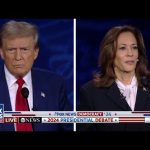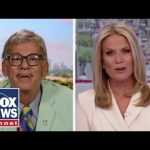### Trump Ditches Debates: A Strategic Move or a Sign of Weakness?
In the world of political drama, few stories are as captivating as a debate showdown between contenders. Recently, Donald Trump made headlines—not for his trademark bravado or Twitter quarrels, but for his unexpected decision to bow out of upcoming debates. After a less-than-stellar performance against Vice President Kamala Harris, sources close to powerful Republican donors suggest that the former president’s choice is not only strategic but perhaps a necessary safeguard for his campaign’s stability.
During the last debate, many observers noted that Trump seemed outmaneuvered by Harris, leading to murmurs among influential GOP donors. Party allies weighed in, expressing concern that a repeat performance could deal significant damage just weeks before an election. With only about 54 days left until voters head to the polls, Trump’s campaign strategists believe it’s wiser to focus on direct engagement rather than risk another disappointing debate appearance.
Notably, some political analysts highlight the historical context, suggesting that debates don’t carry the clout they used to. Beyond the famous case of Kennedy versus Nixon, most recent debates have barely changed the course of elections. Trump’s allies argue he’s better off at rally events, where he can showcase his charisma and directly connect with supporters. His striking ability to energize the crowd could prove more beneficial than answering questions tossed his way by a panel of moderators.
In a move that leaves many speculating, Trump’s decision has been received in varying degrees of approval throughout Republican circles. Some, like former allies, expressed concern that not debating might come off as a lack of confidence, while others commend the strategy—a tactical retreat that may allow Trump to regain his footing. After all, it’s better to control the narrative than risk a brutal public thrashing.
Critics of Trump’s decision point to its impact on his standing with independent voters. Some assert that his last debate performance may have already dented his support among swing voters. A member of the Trump camp, Robert F. Kennedy Jr., who is usually vocal in his support, remarked on the necessity of acknowledging the issues raised during the debates. This statement raised eyebrows, as it seemed to suggest that even his closest allies noticed the slip in performance.
Ultimately, Trump’s decision to forgo future debates sets the stage for a tumultuous election cycle. Will he leap back onto the campaign trail with a vengeance, or has he missed his shot at redefining the public’s perception? One thing is clear: in the political arena, the name of the game is perception. And for Trump and his supporters, it seems, the best defense is sometimes to avoid the field altogether. Whether this calculated move will yield benefits in November remains to be seen, but it certainly has lit a fire under the rallies that Trump loves. Only time will tell if that fire can withstand the heat of a campaign corridor bustling with challengers eager to seize the moment.




